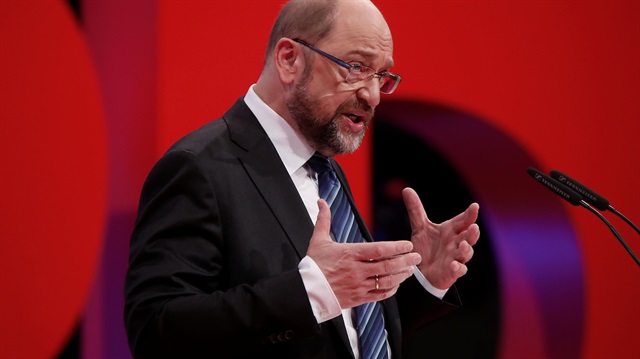
Social Democrat (SPD) leader Martin Schulz appealed to his divided party on Sunday to back formal coalition talks with Chancellor Angela Merkel's conservatives, a move that would bring Germany a step closer to a stable government.
Schulz is facing a backlash from the SPD's left and youth wings, which argue the party should reinvent itself in opposition after in September scoring its worst national election result since Germany became a federal republic in 1949.
Speaking at a party congress that will vote later on Sunday on whether to enter talks, he urged delegates to allow the SPD to serve as Merkel's junior coalition partner again - a sign of the party's diminished fortunes.
"The SPD must and will be visible, audible and recognizable!" Schulz, sounding hoarse after a week of lobbying delegates, said to loud applause.
"We ask for your consent to start coalition negotiations," he told a packed World Conference Center in Bonn, the capital of the former West Germany where late SPD chancellors Willy Brandt and Helmut Schmidt earned reputations as international statesmen.
Around 600 SPD delegates gathered to debate and vote on whether to take the next step to renewing an alliance with Merkel's conservatives that took office in 2013.
The two blocs, which both bled support to the far right in the Sept. 24 election, struck a preliminary deal earlier this month after exploratory talks. But critics, including the party's youth wing leader Kevin Kuehnert, say the blueprint does not bear enough of the SPD's hallmarks.
After Schulz spoke, a clutch of younger speakers addressed the congress in turn and urged delegates to reject coalition talks and instead rebuild the party in opposition.
Kuehnert said Merkel's CDU/CSU bloc had profited from being in government with the SPD at the expense of the Social Democrats and their policies.
"If we were running a bar, we could say the Union have been running up a tab at our place for years... and that is not on," he said to cheers and applause at least as loud as for Schulz.
A copy of the motion on which delegates will vote, seen by Reuters, included language on SPD leaders reaching "concrete, effective improvements" to the blueprint but did not make a final vote on the coalition deal conditional on achieving these.
The envisaged improvements would see conservative concessions on labour, health and migration policies, the motion showed.
"We will fight for further improvements in the coalition negotiations if we can continue the talks," Schulz said.
If a coalition deal is reached, all SPD members will still get to vote on the agreement - another hurdle to achieving a new government in Europe's largest economy, which is humming despite the political uncertainty.
Sunday's vote will be watched across Europe, where Merkel has long played a leading role in economic and security affairs.
Arriving for Sunday's congress, SPD parliamentary leader Andrea Nahles told Reuters she was "cautiously optimistic" about securing a 'yes' vote.
A 'no' would prolong a four-month political deadlock just as its regional partners look to Berlin for leadership on European Union reform in light of Britain's decision to leave the bloc.
Merkel and French President Emmanuel Macron said on Sunday they wanted to deepen bilateral cooperation and give the European Union a fresh push towards closer integration.
Possible scenarios in the event of an SPD rejection include a new election or what would be Germany's first post-war minority government.
"This is about the question: coalition negotiations or new elections!" Schulz said in a 57-minute speech. "I do not believe new elections are the right way for us."
Merkel has said she would prefer a new election - in which poll suggest the SPD would perform even worse than in September - to leading a minority government.
Leading conservatives have rejected SPD demands for more concessions while business associations have urged SPD delegates to back coalition talks.
















